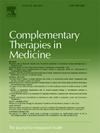比较西方音乐和五行音乐治疗对维持性血液透析患者的影响:一项随机对照试验。
IF 3.5
3区 医学
Q1 INTEGRATIVE & COMPLEMENTARY MEDICINE
引用次数: 0
摘要
背景:由于音乐与文化之间错综复杂的相互作用,西方音乐疗法和五行音乐疗法对中国维持性血液透析患者的比较效果值得进一步研究。方法:随机对照试验,招募维护性血液透析患者87例,按1:1:1的比例随机分为五行音乐组(n = 29)、西洋音乐组(n = 29)和对照组(n = 29)。五行音乐组和西方音乐组的参与者分别接受为期8周的五行音乐治疗和西方音乐治疗,每次60分钟,每周3次。主要结局指标为医院焦虑和抑郁量表得分。次要结局指标为匹兹堡睡眠质量指数、透析症状指数、积极和消极情绪量表得分。在基线、干预第4周结束当天、干预第8周结束当天以及干预结束后1个月随访时测量所有结局指标。结果:广义估计方程结果表明,五行音乐疗法和西洋音乐疗法均能有效缓解维持性血液透析患者的焦虑、抑郁、睡眠障碍以及积极和消极情绪。然而,与西方音乐组相比,五行音乐组患者在焦虑(平均差异= -1.76±0.672,95% CI: 3.37, -0.15, p = 0.027)、抑郁(平均差异= -1.79±0.647,95% CI: -3.34, -0.24, p = 0.017)、积极情绪(平均差异= -3.00±1.062,95% CI: 0.46, 5.54, p = 0.014)和消极情绪(平均差异= -3.38±1.084,95% CI: -5.97, -0.78, p = 0.005)方面的缓解明显大于西方音乐组。相反,五行音乐组与西方音乐组在睡眠质量(平均差异= -1.07±0.776,95% CI: -2.93, 0.79, p = 0.505)和症状相关的困扰(平均差异= 3.62±3.124,95% CI: -3.86, 11.10, p = 0.739)方面无显著差异。结论:五行音乐疗法在改善中国维持性血液透析患者情绪方面的显著益处,突出了文化定制干预的重要性。本文章由计算机程序翻译,如有差异,请以英文原文为准。
Comparing the effects of Western music and five-element music therapy on patients undergoing maintenance hemodialysis: A randomized controlled trial
Background
Due to the intricate interplay between music and culture, the comparative effectiveness of Western music therapy and five-element music therapy for Chinese patients undergoing maintenance hemodialysis warrants further investigation.
Methods
In this randomized controlled trial, 87 patients receiving maintenance hemodialysis were recruited and randomly assigned to the five-element music group (n = 29), Western music group (n = 29), and control group (n = 29) in a 1:1:1 ratio. Participants in the five-element music group and Western music group received eight weeks of five-element music therapy and Western music therapy, respectively, for 60 min per session, three times per week. The primary outcome indicator was the Hospital Anxiety and Depression Scale score. The secondary outcome indicators were the Pittsburgh Sleep Quality Index, Dialysis Symptom Index, and Positive and Negative Emotions Scale scores. All outcome indicators were measured at baseline, on the day of the end of week 4 of the intervention, on the day of the end of week 8 of the intervention, and at the one-month follow-up after the end of the intervention.
Results
The results of the generalized estimating equations indicated that both five-element music therapy and Western music therapy were effective in alleviating anxiety, depression, sleep disturbances, and both positive and negative emotions among patients undergoing maintenance hemodialysis. However, patients in the five-element music group showed significantly greater relief from anxiety (mean difference = −1.76 ± 0.672, 95 % CI: 3.37, −0.15, p = 0.027), depression (mean difference = −1.79 ± 0.647, 95 % CI: −3.34, −0.24, p = 0.017), and both positive (mean difference = −3.00 ± 1.062, 95 % CI: 0.46, 5.54, p = 0.014) and negative emotions (mean difference = −3.38 ± 1.084, 95 % CI: −5.97, −0.78, p = 0.005) compared to those in the Western music group. Conversely, no significant differences were observed in sleep quality (mean difference = −1.07 ± 0.776, 95 % CI: −2.93, 0.79, p = 0.505) or symptom-related distress (mean difference = 3.62 ± 3.124, 95 % CI: −3.86, 11.10, p = 0.739) between the five-element music and Western music groups.
Conclusion
The significant benefits of five-element music therapy in improving emotions in Chinese patients undergoing maintenance hemodialysis highlight the importance of culturally tailored interventions.
求助全文
通过发布文献求助,成功后即可免费获取论文全文。
去求助
来源期刊

Complementary therapies in medicine
医学-全科医学与补充医学
CiteScore
8.60
自引率
2.80%
发文量
101
审稿时长
112 days
期刊介绍:
Complementary Therapies in Medicine is an international, peer-reviewed journal that has considerable appeal to anyone who seeks objective and critical information on complementary therapies or who wishes to deepen their understanding of these approaches. It will be of particular interest to healthcare practitioners including family practitioners, complementary therapists, nurses, and physiotherapists; to academics including social scientists and CAM researchers; to healthcare managers; and to patients. Complementary Therapies in Medicine aims to publish valid, relevant and rigorous research and serious discussion articles with the main purpose of improving healthcare.
 求助内容:
求助内容: 应助结果提醒方式:
应助结果提醒方式:


